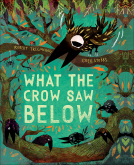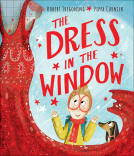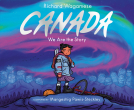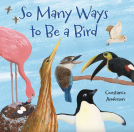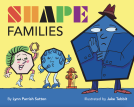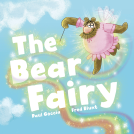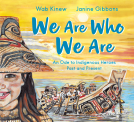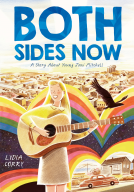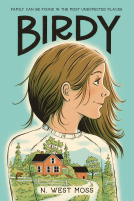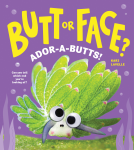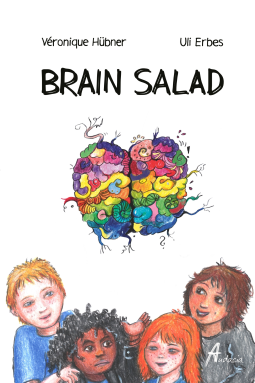
Brain Salad
by Véronique Hübner
This title was previously available on NetGalley and is now archived.
Send NetGalley books directly to your Kindle or Kindle app
1
To read on a Kindle or Kindle app, please add kindle@netgalley.com as an approved email address to receive files in your Amazon account. Click here for step-by-step instructions.
2
Also find your Kindle email address within your Amazon account, and enter it here.
Pub Date Jul 22 2024 | Archive Date Jan 31 2025
Description
How does it feel for children to perceive their environment differently and thus rub others the wrong way?
This book, to be read aloud and also read by children themselves, gives insight into the thoughts and feelings of neurodivergent children - and shows that there are ways to get along with each other.
We all have BRAIN SALAD!
But for Noah, Leah, Oscar and Nancy it is the order of the day. It makes them not get along well with others. It means that someone is always angry with them. And that’s why it makes them lonely and sad.
Luckily, they find each other and form the BRAIN SALAD CLUB. They become friends and not only learn to handle their BRAIN SALAD better, but also recognize their strengths.
Hand drawn illustrations (coloured pencils) on every double page!
No classifications and diagnoses of any kind in this book, but ...
we might be reminded of Autism, ADHD, Fetal Alcohol Spectrum Disorder, Trauma and Attachment Disorder.
The little protagonists could have these diagnoses - or completely different ones. Symptoms often overlap and comorbidity is not uncommon. Clinical psychology is an empirical science. Categorizing individual people into general diagnoses is only possible to a limited extent. Maybe the children's behavior isn't even pathological at all and they're just a little different?
Not only a children' book but also an educational book
to be used by play therapists, school social workers, therapeutic social workers, foster carers, adoptive parents, kinship carers, special guardians and therapeutic parents, to help children to understand themselves and their peers.
This book can
- introduce children to the topic of "neurodivergence"
- sensitize adults to the needs of neurodivergent children
- help to start a conversation with children about conspicuous behavior in peers
- support all those affected
- be used in school – also in elementary school settings, thanks to large letters and plain language
A Note From the Publisher
Available also as paperback on Amazon for 13,50 USD
Available Editions
| EDITION | Hardcover |
| ISBN | 9798325870033 |
| PRICE | $24.50 (USD) |
| PAGES | 52 |
Available on NetGalley
Average rating from 12 members
Featured Reviews
 Reviewer 743878
Reviewer 743878
I read this book the same day my request was approved because it intrigued me as a teacher about how it may relate to students in my classroom. We meet four characters - Oscar, Leah, Noah, and Nancy - and the book introduces you to each child and how their experience leads them to have differing emotions and responses to situations, although anxiety is the main one shared by all four. The book explains how it is understandable to feel anxiety as kids interact with various adults in different situations and that even their development may differ from their peers. It was especially heartwarming to read about how children can be impacted by others' decisions, such as those who were born to a mother who had drank alcohol while pregnant or parents who lost a baby to a miscarriage. The Brain Salad Club connects kids so they can understand and support others and it was a child-friendly way to explain some tough emotions and experiences. I would have loved to see more illustrations in the book but the ones that were included were cute.
This is such a cute book. It follows a number of children who, for different reasons, find the school environment challenging to navigate. The language used is simple and clear and would really help both neurodivergent and neurotypical children to understand each other. I like the way the book tries to give an insight into the triggers that can cause behaviours that other children might find strange, hurtful or scary. It would be really helpful to use in the classroom as a jumping off point for talking about how our brains work and how everyone can experience periods of "brain salad". I can imagine creating a display of the brain salad triggers for a class and how it would be a helpful way to create a safe and happy classroom that treats everyone with respect and care.
This would be a good idea for lower grades kids. It helps kids understand that their bodies and brains all work differently depending on their situations. The term brain salad might be a good metaphor for students
 Benita A, Reviewer
Benita A, Reviewer
Brain Salad is a thought-provoking, well-written book about four neurodivergent friends: Oscar, Leah, Noah, and Nancy. The story explains the troubles they face in their everyday lives and describes their thinking as “Brain Salad.” It also discusses why brains work differently and explores how individuals often feel when they think differently from others.
Oscar struggles with change. When he goes to have his morning snack, he discovers that Max is sitting on his usual wall and that his mother has given him raspberry jam instead of strawberry. It becomes too much for him, and he explodes. He kicks the wall and kicks Max and cannot stop screaming. This action makes things worse, and he feels embarrassed.
Leah feels confused during a game of cops and robbers. One minute, all the children are playing, and then suddenly, the game is over. She notices the teacher glaring at her but does not understand what she has done wrong. The teacher thinks she does not listen, and Leah feels sad because she knows this is false.
Noah sees Lewis from a distance and calls him a funny name because he wants to be friends with him. Noah thought it was funny, but Lewis looked annoyed. He laughs so Lewis will know he was joking, but Lewis looks mad, and Noah realises that he has done the wrong thing. He feels weird and gives him a friendly nudge, which results in being slammed into a wall and kicked hard in the shins. Noah stops laughing and begins to cry. He does not understand why Lewis has kicked him.
Nancy sits in class with her arms crossed and her legs on the desk. She enjoys being naughty and doing what she wants to. Her peers are afraid of her and leave her alone. Her teacher, Mr Cinnamon, talks to her about her behaviour, but she replies disrespectfully, which causes him to become angry and speak loudly. The louder he screams at her, the more his voice is muted. He gets so furious that he needs to leave the room to calm down. Nancy confesses to her classmate Tara that she did not hear him talking to her. She describes her head as a “Brain Salad”.
Leah tells Nancy about her own “Brain Salad,” and Nancy feels relieved because she thinks she is the only person who has experienced this. She now has someone who could understand her. Noah overhears the girls talking and shares about his own “Brain Salad”. Leah suggests they make a Brain Salad Club. They know that Oscar has “Brain Salad”, so they ask him to join also. The children spend a lot of time together and, for the first time, realise that they have friends. They look out for each other and understand when one is experiencing “Brain Salad” and what that person needs.
I highly recommend this book to teachers of 5-10-year-olds as a tool to help their students understand their classmates better.
I like the concept of “Brain Salad”. As someone who has worked with lots of children that struggle with anxiety and various mental health issues, it is important for them to feel like they are not alone. I wish the book dove into how to identify their own brain salad. I like the simple language and clean fonts used. I do think middle grade students would struggle to attend to the book due to simple illustrations. Overall a good concept.
Readers who liked this book also liked:
Lynn Parrish Sutton, illustrated by Jake Tebbit
Children's Fiction, Humor & Satire, LGBTQIAP+
Peter H. Reynolds with Paul A. Reynolds
Children's Nonfiction, Religion & Spirituality

